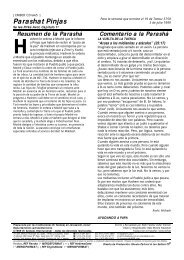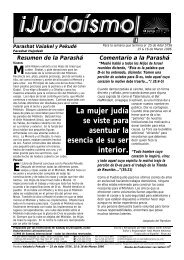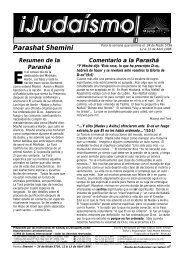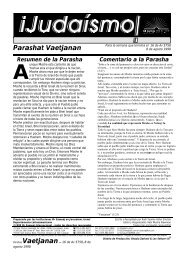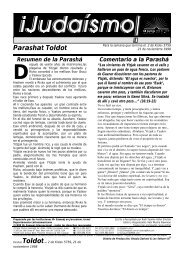Create successful ePaper yourself
Turn your PDF publications into a flip-book with our unique Google optimized e-Paper software.
The essential goal of the<br />
<strong>Pesach</strong> Seder is to<br />
communicate the story of<br />
the going out of Egypt. The<br />
following are insights into<br />
the Hagadah, contributed<br />
by <strong>Ohr</strong> <strong>Somayach</strong> Rabbis.<br />
We sincerely hope they will<br />
enrich your <strong>Pesach</strong> Seder.<br />
<strong>Pesach</strong><br />
Karpas<br />
The Four<br />
Questions<br />
“And if The<br />
Holy One,<br />
Blessed be He, had not taken<br />
our fathers out of Egypt, we<br />
and our children and the<br />
children of our children<br />
would still be under the<br />
domination of Pharaoh in<br />
Egypt.”<br />
The Torah calls <strong>Pesach</strong> “Chag Hamatzos.” But we call it “<strong>Pesach</strong>.” Why is this so? Rav Chaim<br />
Volozhiner explains as follows:<br />
The word Matzos and the word Mitzvos are spelled exactly the same in Hebrew. Thus “Chag<br />
HaMatzos” can be read “Chag HaMitzvos,” meaning that by leaving Egypt and receiving the<br />
Torah, the Jewish People now have the opportunity to earn great reward by doing the Mitzvos.<br />
<strong>Pesach</strong>, on the other hand, means Passover: Hashem “passed over” the houses of the Bnei<br />
Yisrael. By calling it <strong>Pesach</strong>, we emphasize the good that Hashem has done for us.<br />
Our Sages teach us not to serve Hashem with an eye to the reward; rather we should serve<br />
Him out of a sense of love and gratitude. By calling it <strong>Pesach</strong> we de-emphasize the reward that<br />
each Mitzva brings, and instead focus on the good that Hashem has done for us.<br />
Rabbi Reuven Lauffer<br />
The Talmud explains that by beginning the Seder meal in an unusual way, with a vegetable<br />
instead of with bread, the children will be curious and ask, “Why are we beginning the meal<br />
with a vegetable instead of bread?” Once their curiosity is aroused, they will be more attentive<br />
to the story of the Exodus. Why a vegetable? Just as a vegetable serves as an appetizer, so too<br />
the unusual things we do this evening are meant to whet the children’s curiosity.<br />
Rabbi Yehuda Albin<br />
According to the Abarbanel, the son is pointing out a contradiction: On the one hand, we<br />
recline like free people and dip our food like aristocrats. But, on the other hand, we eat “bread<br />
of affliction” and bitter herbs. Are we celebrating freedom here, or are we commemorating the<br />
slavery?<br />
The answer is both!<br />
“We were slaves to Pharaoh in Egypt, and Hashem, our G–d, took us out from there with a<br />
‘strong hand’...” Tonight we experience the transition from slavery to freedom.<br />
Rabbi Dovid Gottlieb<br />
“Kiddush Hashem” — Sanctifying the Name of Heaven by giving up one’s life — is not a<br />
Mitzva that every Jew has the opportunity to fulfill. And so it was that in Auschwitz a debate<br />
arose amongst the religious inmates: What is the correct form of the Bracha for this Mitzva?<br />
“Baruch Atah...L’kadesh Shmo B’rabim” (Blessed are You...Who has commanded us ’to<br />
sanctify’ His Name in public), or “...Al Kiddush Shmo B’rabim” (...Who has commanded us<br />
’concerning the sanctification’ of His Name in public).<br />
The Rabbi was asked, and he answered: For a Mitzva that one can do on someone else’s<br />
behalf, one says “Al.” But for a Mitzva that one can only do oneself, like putting on Tefillin<br />
one says “L” — “L’haniach Tefillin.” Since giving up one’s life is not something that one can do<br />
on someone else’s behalf, the correct form of the Bracha is “L’Kadesh Shmo B’rabim.”<br />
When a person looks death in the face and is concerned as to the exactitude of the Bracha he<br />
will make as he exits this world -- this is someone who can never be enslaved. Once Hashem<br />
redeemed us from Egypt, our oppressors may dominate our bodies, but our souls can never<br />
again be enslaved.<br />
Rabbi Yaakov Asher Sinclair<br />
Compiled by Rabbi Reuven Subar for the <strong>Ohr</strong> <strong>Somayach</strong> Office of Information and Communication General Editor: Rabbi Moshe Newman<br />
©1995 <strong>Ohr</strong> <strong>Somayach</strong> International - All rights reserved.<br />
Production Design: Lev Seltzer<br />
If you have access to InterNet E-Mail, you can receive publications like this one minutes after they become available.<br />
Approximately once a month we will automatically send the latest publication to your E-Mail box.<br />
Just subscribe to the OS-SPECIAL list.<br />
To subscribe, send the message "sub os-special {Your Full Name} " to listserv@jer1.co.il<br />
Please note that <strong>Ohr</strong> <strong>Somayach</strong> has a new InterNet E-Mail address: ohr@jer1.co.il
The Wicked<br />
Son<br />
What does he say?<br />
"What does this drudgery<br />
mean to you!"<br />
...And the<br />
One Who<br />
Does Not<br />
Know How<br />
to Ask<br />
And it is<br />
This...<br />
And They<br />
Embittered<br />
Their<br />
Lives...<br />
The Festive<br />
Meal<br />
Hallel<br />
1. In our lowliness, he<br />
remembered us...<br />
2. and redeemed from our<br />
oppressors<br />
3. He gives food to all flesh...<br />
4. Praise G-d of the heavens!<br />
The wicked son’s question is a quote from the Torah: “When your children will say to you...what<br />
does this drudgery mean to you!” The key to his wickedness lies in the word “say.” He doesn’t<br />
ask a question at all; rather, he “says.” Therefore...<br />
You should take the shine out of his teeth and say, “It’s for this that Hashem did for me when I left<br />
Egypt.” “For me and not for him.”<br />
The word “him” is in the third person. Since the wicked son’s question is rhetorical, it gets no direct<br />
response. To whom, then, is the father speaking? To the son who “doesn’t know how to ask a question.”<br />
He, like the wicked son, asks no questions. Therefore, he is in danger of developing into a “wicked son”<br />
himself. The father looks at this son and warns him, “for me and not for him...Don’t let his sarcastic<br />
smirk fool you ... Had he been in Egypt, he would have assimilated into Egyptian society, and would not<br />
have been redeemed.”<br />
Rabbi Gavriel Rubin<br />
The Chida -- Rabbi Chaim Yosef David Azulai -- in his commentary “Simchat HaRegel” on the Hagadah,<br />
explains that there are three ways one can fulfill the Mitzva of the telling of “Yetzias Mitzrayim. Ideally,<br />
the story should be told in the form of question and answer. The Talmud derives this from the Torah’s<br />
description of Matza as “Lechem Oni” -- the bread over which a person answers.<br />
The second level is to tell the story even if nobody asks. This is derived from the verse “and you shall tell<br />
your son on that day...” You should tell him, even if he doesn’t’ ask. Thus, the procedure of question<br />
and answer is preferable, but not absolutely necessary. (This is a rare example of L’chatchila and B’dieved<br />
in a Torah Mitzva.)<br />
The third level is this: Even if a person is alone, he must speak about the going out of Mitzrayim. This is<br />
what Rabban Gamliel teaches when he says that one must “say” three particular statements as the bare<br />
minimum to fulfill the Mitzva. Thus, there are three possible levels on which to perform the Mitzva of<br />
“Sippur Yetzias Mitzrayim.”<br />
The Chida adds: When introducing the fourth son The Hagadah uses the word “and.” This teaches us<br />
that even if someone has other sons that fit into the first three categories, he should also pay attention to<br />
the one who does not know how to ask. This is an important lesson for those who are tempted to make<br />
the Hagadah an intellectual display which goes over the head of the youngest or least knowledgeable.<br />
Rabbi Ephraim Yawitz<br />
“...which has stood for our fathers and for us; for in each and every generation they stand against<br />
us to destroy us, and Hakadosh Baruch Hu rescues us from their hand.”<br />
Exactly what “This” refers to is not immediately clear. Is it the promise made to Abraham,<br />
mentioned previously? Or that “Hakadosh Baruch Hu always rescues us from their hand?”<br />
Here is a third possibility -- a unique insight into the phenomenon of anti-Semitism: This, that “in<br />
each and every generation they stand against us to exterminate us” -- This is what has stood for us.<br />
Hard as we may try to forget our Jewishness and adopt the ways of our host nation, sooner or later<br />
they rise against us, remind us of our uniqueness, and awaken our commitment to Judaism.<br />
Rabbi Shlomo Zweig, in the name of his father’s father<br />
During a scholarly lecture, a simple person asked Rabbi Yonasan Eybeschitz the following: The<br />
Torah says, “and they embittered their lives,” but the cantillation symbol that the cantor reads is a<br />
happy tune! The simplicity of his question amused the more erudite listeners.<br />
“Excellent Question!” said Rabbi Yonasan. “Hashem told Abraham that his offspring would be in<br />
exile for 400 years. But in fact we were in Egypt for only 210 years. Why was this? Since the<br />
Egyptians “embittered their lives,” Hashem had pity on us and shortened the exile by 190 years --<br />
surely a cause for song!<br />
“By the way,” said Rabbi Yonason, to the astonishment of his listeners, “the cantillation symbol,<br />
‘Kadma V’Azla,’ hints at this idea by its exact numerical value: 190.<br />
Rabbi Yehoshua Karsh<br />
One of the unique aspects of the Seder is that we interrupt the saying of the Hallel with a meal.<br />
Why is that? The Netziv explains as follows: The purpose of going out of Egypt was to receive the<br />
Torah. With the Torah we gain the ability to serve Hashem not only through “spiritual” means,<br />
such as Torah study and prayer, but through “physical” Mitzvos as well, such as marriage,<br />
enjoying Shabbos, eating matza, marror, and the <strong>Pesach</strong> offering. We eat in the middle of Hallel<br />
in order to praise Hashem for sanctifying and elevating our physical existence. Even “mundane”<br />
things like eating are elevated when we do them in the service of Hashem.<br />
Rabbi Mordechai Perlman<br />
These last four phrases of “Hallel HaGadol” can be seen as paralleling the four cups we drink<br />
tonight. Over the first cup we make kiddush and declare, “You chose us from all the nations.”<br />
Why did G-d choose us? The Sages explain that Hashem chose the Jewish people because of their<br />
humility. “In our lowliness” -- in our humility, “He remembered us” and chose us. The second<br />
cup goes together with the Hagadah, where we tell how Hashem “ redeemed us from our<br />
oppressors.” Bircas Hamazon, where we recognize that “He gives food to all flesh” is said over<br />
the third cup. And with the fourth cup we sing Hallel...“ Praise Hashem of the heavens!”<br />
Rabbi Yehuda Samet<br />
©1995 <strong>Ohr</strong> <strong>Somayach</strong> International - All rights reserved. This publication contains words of Torah. Please treat it with due respect. Do not let this land on a garbage heap.








